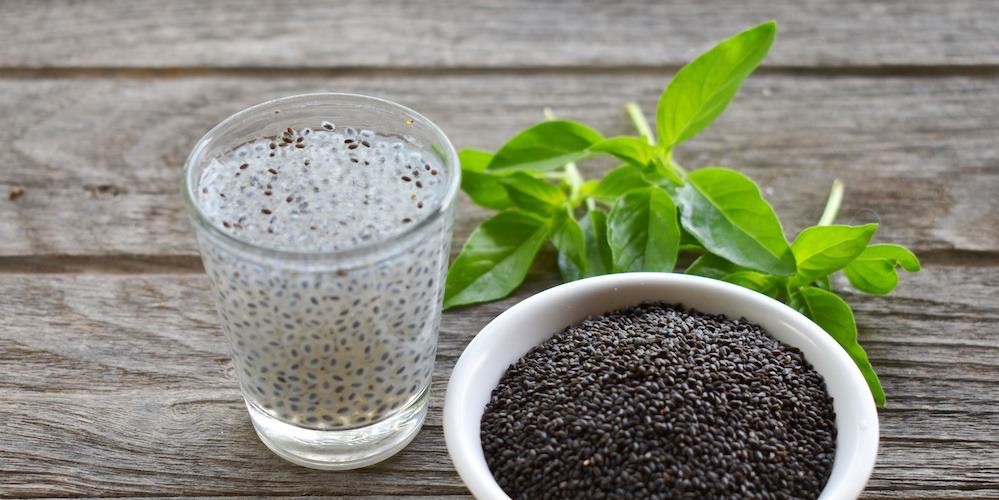BENEFITS OF BASIL SEEDS
✓ Source of fiber
✓ Source of fatty acids
✓ Exert antioxidant action
✓ Reduce fever
✓ May relieve inflammatory bowel diseases
What are basil seeds?
Basil (Ocimum basilicum) is a plant whose fragrant leaves are used in cooking. It belongs to the Lamiaceae family, which includes many other aromatic plants: mint, rosemary, sage, thyme… The genus Ocimum comprises different varieties of basil, including common basil, large-leaved basil, and Tulsi or holy basil (Ocimum tenuiflorum).
Also called ‘the royal herb’, basil is native to South Asia. It is a perennial plant that can reach 60 cm in height. It produces numerous crinkled leaves that appear in various shades of green. From June to September, basil produces a beautiful display of pale pink and violet flowers. Once faded, it sets seed to reproduce. Basil seeds are thin, black, and elongated.
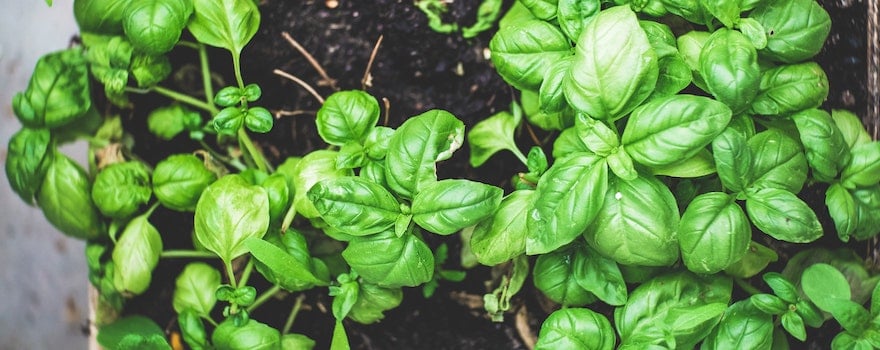
Gradually, basil cultivation spread throughout Asia and the countries bordering the Mediterranean. Traces of its use are found in ancient Egypt and Greece, where it was part of the traditional pharmacopoeia.
According to this review, basil was notably used to relieve diarrhea, headaches, digestive disorders, and respiratory conditions. In such cases, it was the leaves or the flowering tops of basil that were used.
But it is less commonly known that the seeds also contain many benefits.
Basil seeds are an excellent source of fiber, known to improve bowel transit. They are also a source of protein, minerals, trace elements, fatty acids and antioxidant compounds. An exceptional composition that allows them to have beneficial effects on the body. They may help reduce fever and are promising for relieving inflammatory bowel diseases.
Still relatively unknown, basil seeds fully deserve their place among the superfoods, alongside the chia seeds.
Nutritional composition
- Vitamins : vitamin A, beta-carotene, C, K
- Minerals and trace elements : potassium, magnesium, calcium, iron
- Fiber
- Protein
- Carbohydrates
- Fatty acids : alpha-linolenic acid, linoleic acid
- Essential oils
- Antioxidant compounds : polyphenols, polysaccharides, flavonoids
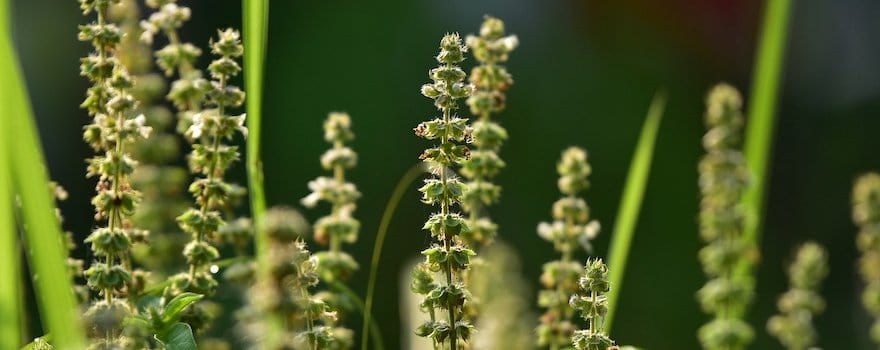
Benefits of basil seeds
♻️ Source of fiber
Basil seeds contain a large amount of dietary fiber, notably soluble fiber. Thus, 1 tablespoon of basil seeds provides 6 g of fiber, helping to partially meet the recommended daily intake (25 to 30 g of fiber per day).
Fiber plays an important role in bowel transit and gut health. It promotes the elimination of toxins, improves digestion, and feeds the microbiota. Fiber also creates a feeling of fullness, an effect that’s useful when trying to avoid snacking, maintain a healthy weight, or lose weight.
The fibers in basil seeds also have a beneficial effect on blood sugar control in cases of type 2 diabetes. Indeed, by slowing the absorption of carbohydrates, they help regulate blood sugar levels and prevent blood sugar spikes.
Finally, basil seeds help reduce bad cholesterol (LDL cholesterol). Their soluble fibers act like a sponge, absorbing the bad cholesterol carried in the blood and removing it.
This study from the University of Sharjah (India), conducted on diabetic rats, shows how the aqueous extract of basil seeds reduced blood glucose levels.
🐟 Source of fatty acids
Basil seeds are packed with fatty acids. They primarily contain alpha-linolenic acid (ALA), a polyunsaturated fatty acid from the omega-3 family. Also present in chia seeds, it is a precursor to other omega-3s such as eicosapentaenoic acid (EPA) and docosahexaenoic acid (DHA).
Alpha-linolenic acid plays an important role in many physiological functions. In particular, it contributes to good cardiovascular health and the functioning of the central nervous system.
Basil seeds also contain linoleic acid, a polyunsaturated fatty acid of the omega-6 type. It contributes to the structure of cell membranes, plays a role in the inflammatory response, and supports immune system function.
This study from Azad Islamic University (Iran), conducted on basil seeds, shows differences in fatty acid composition and quantity depending on their geographic origin.
🥝 Have antioxidant properties
Basil seeds contain antioxidant compounds including polyphenols, flavonoids, and polysaccharides. All have a powerful effect against free radicals.
By fighting free radicals and their buildup, basil seeds prevent much damage to the body. They limit cellular aging and reduce the risk of cardiovascular diseases.
During this study from the University of Nizwa (Oman), conducted directly in the laboratory, researchers showed that basil seeds contain a large amount of antioxidant phenols (785.76 mg/100 g).
🌡 Reduce fever
Basil seeds exert an antipyretic effect, meaning they fight fever. They act on the febrile response and on abnormal increases in body temperature.
In the same way as aspirin, basil seeds inhibit the formation of prostaglandins, molecules that sustain fever. They are effective in cases of fever related to an infection, inflammation, or following the use of certain medications.
This study from Sultan Qaboos University (Oman), conducted on rats, shows how basil oil extracted from the seeds significantly reduced the febrile response.
🌵 May relieve inflammatory bowel diseases
Some researchers have examined the action of basil seeds to relieve inflammatory bowel diseases (IBD): Crohn’s disease, ulcerative colitis…
This review from Tehran University of Medical Sciences (Iran) indicates that they may be effective in combination with other plants such as black nightshade, psyllium blond or boswellia, a powerful anti-inflammatory.
However, further studies are still needed to confirm the beneficial effects of basil seeds on inflammatory bowel disease.
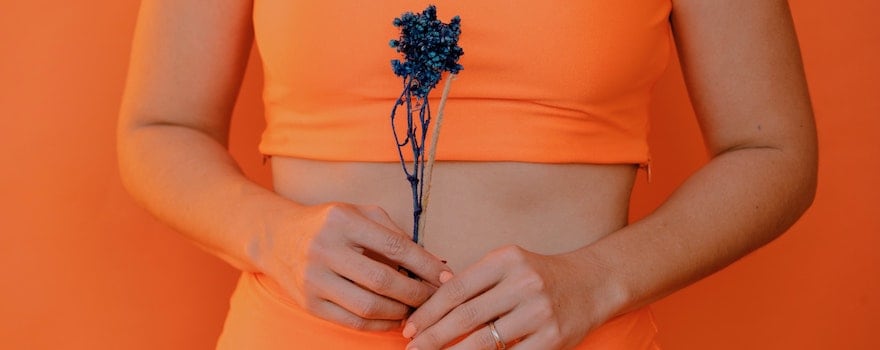
How to consume basil seeds?
Dried basil seeds
Basil seeds are most often sold in packets. They are first harvested, then dried and packaged. It is the simplest format and the easiest to find in stores, specialty shops or online.
Before consuming them, it is essential to soak them in water for about 15 minutes. Use 13 g of seeds for 240 ml of water. This allows them to swell, take on a gelatinous texture and release nutrients beneficial for the gut.
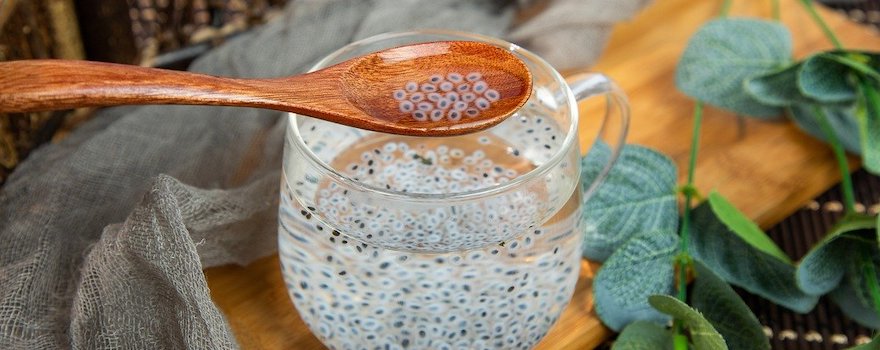
Les graines de basilic séchées peuvent se boire simplement avec de l’eau ou être ajoutées dans des jus de fruits, des smoothies, des yaourts, des glaces… Elles servent aussi à la préparation de nombreuses boissons traditionnelles comme le Falooda, une boisson lactée d’Inde qui associe les graines de basilic aux perles de tapioca issu du manioc. Vous pouvez même réinventer le célèbre chia pudding en remplaçant les graines de chia par des graines de basilic !
Basil seeds for sprouting
It is also possible to find basil seeds for sprouting, which are interesting for their nutritional qualities. In fact, it is during germination that basil seeds contain the maximum amount of nutrients.
This technique is carried out in a germination dish and can take up to 20 days. Once the sprouts have reached about 3 cm, they are eaten raw, as a seasoning, in salads, in dressings… Their flavor is reminiscent of pistou.
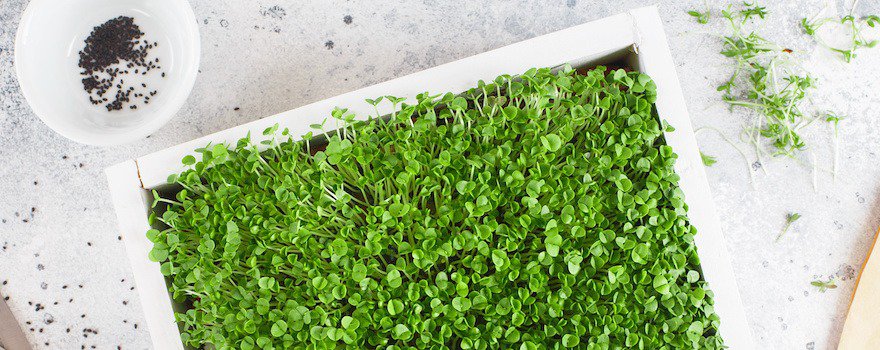
Basil seeds and superfoods
To improve digestion, basil seeds pair well with other fiber-rich superfoods such as chia seeds, carob and hemp, or psyllium.
To lose weight, basil seeds can be consumed as a drink or in an infusion with matcha tea or yerba mate.
Consume sustainably: favor organic, local, and fair-trade basil seeds
✓ Unfortunately, aromatic herbs are also subject to chemical treatments : pesticides, insecticides, fungicides… It is not uncommon for basil to be among the plants regularly tested to detect banned substances or substances present above the regulatory threshold. Sometimes residues of pyriproxyfen or mercaptodimethur are found, powerful chemical agents. That is why it is better to choose basil seeds grown organically, without pesticides or chemical insecticides.
✓ Basil grows very well in our regions. Many French producers cultivate it and offer fresh basil. But few grow it to commercialize its seeds. The choice of dried basil seeds is still limited and they most often come from India or Egypt. In that case, favor fair trade channels that guarantee a fair income to small producers and that contribute to local projects.
Dosage
There is no real recommended dosage for consuming basil seeds. Just be careful not to overdo it.
Dried basil seeds : up to 20 g per day
Contraindications and side effects
Consumption of basil seeds has some contraindications :
- As a precaution, consumption of basil seeds is not recommended for young children ;
- Because of their effect on estrogen levels, pregnant or breastfeeding women should avoid taking basil seeds ;
- People suffering from coagulation disorders should also avoid consuming them ;
- Basil seeds can interact with certain blood coagulation medications for blood clotting.
Excessive consumption of basil seeds may cause the following side effects :
- Indigestion
- Bloating
If you experience side effects, stop consuming them and consult a doctor.
History, cultivation, and market of basil seeds
Basil seed is of interest to many sectors today. In the food industry, it is used as a texturizing agent because of its gelling and thickening action. Some brands also offer detox or appetite-suppressing drinks made from basil seed.
The gelatinous mucilage that surrounds basil seeds also has a use. Because of its water-retention capacity, it is used for the manufacture of hydrogel dressings.
As for the basil seed gum derived from mucilage, it is used as an emulsifying, foaming, thickening, gelling, binding, and stabilizing agent in the food and pharmaceutical industries.
Report prepared by Julia Perez and Charlotte Jean
Sources and scientific studies
Shadi Sarahroodi, Somayyeh Esmaeili, Peyman Mikaili, Zahra Hemmati, and Yousof Saberi, 2012. The effects of green Ocimum basilicum hydroalcoholic extract on retention and retrieval of memory in mice.
Sachin Chaudhary, Amit Semwal, Hitesh Kumar, Harish Chandra Verma, Amit Kumar, 2016. In-vivo Study for Anti-Hyperglycemic Potential of Aqueous Extract of Basil Seeds (Ocimum Basilicum Linn) and Its Influence on Biochemical Parameters, Serum Electrolytes and Haematological Indices.
Sahar Mostafavi, Hossein Ali Asadi-Gharneh, Mohammad Miransari, 2019. The Phytochemical Variability of Fatty Acids in Basil Seeds (Ocimum Basilicum L.) Affected by Genotype and Geographical Differences.
Fazal Mabood, Syed Abdullah Gilani, Javid Hussain, Sulaiman Alshidani, Said Alghawi, Mohammed Albroumi, Saif Alameri, Farah Jabeen, Zahid Hussain, Ahmed Al-Harrasi, Zahra K M Al Abri, Saima Farooq, Zakira Naureen, Ahmad Hamaed, M Rasul Jan, Jasmin Shah, 2017. New Design of Experiment Combined With UV-Vis Spectroscopy for Extraction and Estimation of Polyphenols From Basil Seeds, Red Seeds, Sesame Seeds and Ajwan Seeds.
M.Y. Al-Maskari, Muhammad Asif Hanif, A.Y. Al-Maskri, Samir AlAdawi, 2012. Basil: A natural source of antioxidants and neutraceuticals.
Roja Rahimi, Mohammad Reza Shams-Ardekani, and Mohammad Abdollahi, 2010. A review of the efficacy of traditional Iranian medicine for inflammatory bowel disease.
Siriporn Tantiwatcharothai, Jutarat Prachayawarakorn, 2019. Property Improvement of Antibacterial Wound Dressing From Basil Seed (O. Basilicum L.) Mucilage- ZnO Nanocomposite by Borax Crosslinking.
Sara Naji-Tabasia, Seyed Mohammad Ali Razavib, 2017. Functional properties and applications of basil seed gum: An overview.


